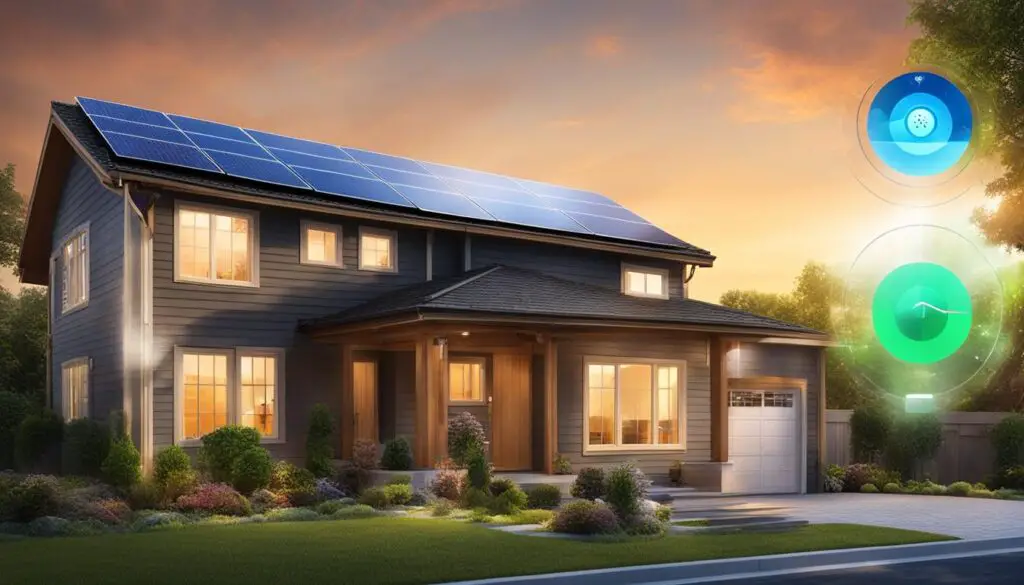Hello! I’m excited to guide you on your journey to easy smart home energy monitoring. Whether you’re looking to save money, reduce waste, or lead a more sustainable lifestyle, monitoring your energy usage is a smart choice for beginners like us. Let’s dive in and discover how simple and effective it can be to take control of your energy consumption.
- Smart home energy monitoring is a simple and effective way for beginners to take control of their energy usage.
- By utilizing budgeting apps, eliminating unnecessary subscriptions, and practicing smart grocery shopping, beginners can establish a solid financial foundation while reducing waste.
- Switching to energy-efficient devices, exploring thrift shopping, and cooking at home are additional steps beginners can take to lower energy bills and save even more.
- With the right habits and practices, beginners can easily monitor their energy usage and make smart choices for a more sustainable and economical lifestyle.
Table of Contents
Establishing a Budget
The first step in smart home energy monitoring for beginners is to establish a budget. By understanding your income and expenses, you can gain a clear picture of your financial situation and set goals for saving on energy costs.
There are various tools and methods you can use to plan your budget effectively. Budgeting apps and traditional spreadsheets are helpful tools for tracking your spending and setting financial boundaries. These tools allow you to categorize your expenses, monitor your cash flow, and identify areas where you can cut back and save.
Creating a budget not only helps you track your energy expenses but also empowers you to improve your overall financial well-being. It allows you to make informed decisions about your energy usage and identify areas where you can reduce waste and save money.
The Benefits of Budget Planning
Establishing a budget has several benefits:
- It helps you identify and prioritize your financial goals.
- It allows you to allocate funds specifically for energy expenses, ensuring you have enough to cover your basic needs.
- It helps you track your progress towards your savings targets.
- It enables you to identify unnecessary expenses and find ways to eliminate or reduce them.
By setting a budget, you can take control of your finances and make conscious decisions to reduce your energy costs while still enjoying a comfortable lifestyle.
Here’s a simple example of how a budget can be structured:
| Category | Monthly Budget |
|---|---|
| Housing | $1,200 |
| Utilities | $200 |
| Transportation | $300 |
| Groceries | $400 |
| Entertainment | $100 |
| Savings | $500 |
| Other | $300 |
| Total | $3,000 |
Keep in mind that this example budget can be adjusted based on your individual income, expenses, and savings goals. Regularly review and update your budget to reflect any changes in your financial situation.
By establishing a budget, you are laying the foundation for a financially disciplined year and taking an important step towards smart home energy monitoring.
Reducing Unnecessary Subscriptions
February is the perfect time for beginners to take a closer look at their subscriptions and cut back on unnecessary expenses. Many of us underestimate just how much we’re spending on streaming services and other subscriptions, which can quickly add up and drain our budgets. By canceling subscriptions that are no longer necessary or providing value, we can save money and reduce our monthly expenses, ultimately improving our overall financial well-being.
Eliminating unnecessary subscriptions might seem like a small adjustment, but it can have a significant impact on our finances. By reassessing our current subscriptions and being honest with ourselves about which ones we truly use and value, we can free up extra funds for more important things, like savings or investments.
Why Are Subscriptions a Concern?
While individual subscriptions might seem affordable, the cumulative cost of multiple services can quickly become a financial burden. According to a recent study, the average American spends over $200 per month on subscriptions. That’s over $2,400 per year! By cutting back on unnecessary subscriptions, we can redirect those funds toward achieving our financial goals.
“Unnecessary subscriptions can lead to wasted money and a lack of control over our finances. Taking the time to evaluate our subscriptions allows us to regain financial control and allocate our resources more wisely.”
It’s important to regularly assess our subscriptions and consider whether they continue to provide value and align with our current needs and goals. While it can be difficult to let go of some services we enjoy, prioritizing our financial well-being is crucial for long-term success.
How to Audit Your Subscriptions
Auditing subscriptions is a straightforward process that can yield significant savings. Here are some simple steps to get started:
- Categorize your subscriptions: Make a list of all your subscriptions and categorize them into groups like entertainment, news, fitness, etc. This will help you see the bigger picture.
- Evaluate each subscription: For each subscription, ask yourself if it adds value to your life and if you consistently use it. Consider if there are alternative free options available for similar services.
- Identify unnecessary subscriptions: Highlight the subscriptions that are no longer necessary or provide little value. These are the ones you should consider canceling.
- Take action: Contact the providers of the unnecessary subscriptions and cancel them. Make a note to review your subscriptions periodically to ensure you don’t accumulate new unnecessary ones over time.
By taking these steps, we can regain control over our subscriptions and use our hard-earned money more intentionally. It’s important to remember that it’s okay to treat ourselves occasionally, but being mindful of our expenses and eliminating unnecessary subscriptions can have a positive impact on our financial well-being.
Practicing Smart Grocery Shopping
In March, I focus on mastering the art of smart grocery shopping. It’s a skill that not only helps beginners save money but also contributes to a more sustainable lifestyle. By adopting a few simple strategies, you can reduce food waste and make smart choices for your grocery budget.
Plan Meals and Make Shopping Lists
One of the key elements of smart grocery shopping is planning your meals in advance. Taking the time to create a weekly meal plan allows you to make a precise shopping list, ensuring you only buy what you need. This helps you avoid impulse buys and reduces the risk of food going to waste.
“Planning my meals ahead of time has been a game-changer. I no longer buy items on a whim, and it has significantly cut down on food waste and my grocery bill.” – Sarah, a beginner in smart grocery shopping.
In addition to saving you money, meal planning also saves you time. With a clear idea of what you’ll be cooking each day, you can streamline your shopping trips and avoid multiple visits to the store.
Opt for Seasonal Produce and Buy in Bulk
When it comes to selecting produce, choosing seasonal fruits and vegetables is a smart choice. Not only are they fresher and tastier, but they’re also usually more affordable. Seasonal produce is abundant, which often leads to lower prices, benefiting both your wallet and the environment.
| Seasonal Produce in March | Benefits |
|---|---|
| Spinach | Rich in nutrients, versatile for salads and cooked dishes. |
| Broccoli | Packed with vitamins and fiber, perfect for stir-fries and roasted dishes. |
| Carrots | Budget-friendly, great for snacking, salads, and soups. |
Additionally, buying non-perishable items in bulk can help you save money in the long run. Items like rice, pasta, and canned foods often have a longer shelf life and can be purchased in larger quantities, reducing their overall cost.
Reducing Food Waste
Food waste is a significant problem, both environmentally and financially. According to research, Americans waste a staggering amount of food each year, resulting in billions of dollars lost.
By practicing smart grocery shopping, you can help combat food waste. By buying only what you need, storing food properly, and utilizing leftovers creatively, you can significantly reduce waste and save money.
“Minimizing food waste has become a priority for me. I’ve learned to repurpose leftovers into delicious new meals, and it’s not only saved me money but also sparked my creativity in the kitchen.” – Mark, a beginner in smart grocery shopping.
Remember, reducing food waste isn’t just about saving money—it’s about being conscious of the impact we have on our planet. By making thoughtful choices at the grocery store, you can contribute to a more sustainable and environmentally friendly future.
To further illustrate the importance of practicing smart grocery shopping and reducing food waste, take a look at the image below:

Embracing Energy Efficiency
When it comes to reducing energy bills, even beginners can make a significant impact by embracing energy efficiency. Small changes in daily habits can lead to big savings and contribute to a more sustainable environment. Let’s explore some simple yet effective ways beginners can reduce energy consumption and save money.
Switch to LED Bulbs
One of the easiest steps you can take to improve energy efficiency is to switch from traditional incandescent bulbs to LED bulbs. LED bulbs use significantly less energy and last much longer, resulting in lower electricity bills and reduced environmental impact. Make the switch and start seeing the savings.
Utilize Smart Thermostats
Smart thermostats are a valuable tool for beginners looking to optimize energy usage. These devices allow you to program and control your home’s temperature, ensuring efficient heating and cooling. By setting appropriate schedules and adjusting the temperature when needed, you can save money on heating and cooling costs without sacrificing comfort.
Unplug Unused Devices
Many devices continue to consume energy even when they’re turned off or in standby mode. Get into the habit of unplugging chargers, appliances, and electronics that aren’t in use. This simple action can prevent standby power usage, known as vampire power, and help you reduce your energy bills.

“Energy-efficient habits not only help beginners save money, but also contribute to a more sustainable environment.”
When we embrace energy efficiency, we not only benefit financially but also contribute to a greener and healthier planet. By adopting these energy-saving practices, beginners can reduce their carbon footprint and take important steps towards a more sustainable lifestyle.
As we continue on our journey towards smarter energy consumption, let’s remember that every small change matters. By taking action today, we can create a more energy-efficient future for ourselves and generations to come.
Exploring Thrift Shopping
June calls for a wardrobe refresh, thrift style! As a beginner, I encourage you to explore your local thrift stores when looking for clothing and home goods. Thrift shopping is not only budget-friendly but also environmentally friendly. By opting for second-hand items, you can save money and contribute to a more sustainable lifestyle.
Thrift stores offer a wide variety of gently used items at affordable prices. You never know what hidden gems you might find! Whether it’s a trendy piece of clothing, unique furniture, or vintage decor, thrift stores are full of surprises. Shopping at thrift stores allows you to express your personal style without breaking the bank.
One of the benefits of thrift shopping is the opportunity to reduce waste and promote recycling. By giving pre-loved items a second life, you actively participate in the circular economy and help reduce the demand for new products. It’s a win-win situation!
When thrift shopping, keep an open mind and be patient. Take your time to browse through the aisles and racks. You may need to dig a little deeper to find exactly what you’re looking for, but the thrill of the hunt is part of the fun.
Tips for Successful Thrift Shopping:
- Make a list of items you need or want before heading to the thrift store.
- Set a budget to avoid overspending.
- Try on clothing to ensure a proper fit.
- Inspect items for any damages or signs of wear.
- Don’t be afraid to negotiate prices, especially if an item has minor flaws.
Thrifting is not only about saving money — it’s about embracing sustainability and individuality. By exploring thrift stores, you can curate a unique wardrobe and home decor while making a positive impact on the planet.
So, grab your reusable shopping bags and embark on a thrift shopping adventure. You’ll be amazed at the treasures you can find while staying within your budget. Join the movement of frugal fashionistas and savvy shoppers who know that style doesn’t have to come with a hefty price tag.
| Benefits of Thrift Shopping for Beginners | How it Benefits Beginners |
|---|---|
| Save money | Thrift shopping offers affordable options for clothing and home goods. |
| Promote sustainability | By buying second-hand items, beginners contribute to reducing waste. |
| Discover unique items | Thrift stores are full of hidden gems that allow beginners to express their individual style. |
| Support local communities | Thrift stores often operate as non-profit organizations, supporting various community initiatives. |
Cooking at Home
July is the month for beginners to challenge themselves to cook more meals at home. Home-cooked meals are not only cheaper but often healthier than eating out. By opting to cook and eat at home, beginners can save money and have control over the ingredients used in their meals. The average home-cooked meal costs significantly less than dining out, making cooking at home a smart choice for beginners looking to save on their food expenses.
The Benefits of Cooking at Home
When it comes to cooking at home, there are numerous benefits that beginners can enjoy. First and foremost, cooking your meals allows you to save money. Eating out can be expensive, especially if you do it frequently. By cooking at home, you can significantly reduce your food expenses and allocate that money elsewhere, such as savings or paying off debts.
Cooking at home also gives you control over the ingredients used in your meals. You can choose high-quality, organic, and fresh ingredients to create delicious and nutritious dishes. This is particularly essential for beginners who want to prioritize their health and make conscious food choices.
Getting Started with Cooking at Home
If you’re new to cooking at home, here are a few tips to help you get started:
- Plan your meals in advance: Take some time to plan your meals for the week, including breakfast, lunch, dinner, and snacks. This will help you create a shopping list and avoid unnecessary purchases.
- Utilize affordable ingredients: Focus on budget-friendly ingredients like grains, legumes, and seasonal fruits and vegetables. These ingredients are not only cost-effective but also versatile and nutritious.
- Experiment with simple recipes: Start with easy and beginner-friendly recipes. Look for recipes online or in cookbooks that require minimal ingredients and preparation time.
- Make it a fun activity: Cooking at home can be a joyful and relaxing experience. Involve your family or friends and turn it into a social activity. Experiment with different flavors and cuisines to keep things interesting.
Remember, cooking at home is a skill that takes time to develop. Don’t be discouraged if your first attempts are not perfect. With practice, you’ll become more confident and skilled in the kitchen.
“Cooking at home is not only a way to save money, but it also promotes healthier eating habits and fosters creativity in the kitchen.” – Chef Julia Child
Conclusion
Adopting easy smart home energy monitoring habits can have a significant impact on your finances and overall lifestyle. By establishing a budget, eliminating unnecessary subscriptions, and practicing smart grocery shopping, you can set a solid financial foundation. Embracing energy efficiency, exploring thrift shopping, and cooking at home are additional steps you can take to reduce your energy bills and save money.
With these habits in place, you can easily monitor your energy usage, make informed choices, and enjoy the financial benefits of smart home energy monitoring. Not only will you see the savings reflected in your monthly bills, but you’ll also contribute to a more sustainable and eco-friendly environment.
So, whether you’re a beginner or someone looking to improve their energy monitoring skills, these tips will help you take control of your energy usage, save money, and lead a more sustainable lifestyle. Start implementing these habits today, and watch the positive impact on your finances and the environment.
FAQ
What is smart home energy monitoring?
Smart home energy monitoring is a simple and effective way for beginners to take control of their energy usage and save money. It involves using technology and strategies to monitor and manage energy consumption in the home.
How can beginners establish a budget for energy monitoring?
The first step in smart home energy monitoring for beginners is to establish a budget. By understanding their income and expenses, beginners can gain a clear picture of their financial situation and set goals for saving on energy costs. Budgeting apps and traditional spreadsheets are helpful tools for tracking spending and setting financial boundaries.
How can beginners reduce unnecessary subscriptions?
February is the month for beginners to audit their subscriptions and eliminate unnecessary ones. Many people underestimate their spending on streaming services and other subscriptions, which can add up to significant costs over time. By canceling subscriptions they no longer use, beginners can save money and reduce their monthly expenses.
What are some tips for practicing smart grocery shopping?
March is dedicated to mastering the grocery game. By planning meals, making shopping lists, and avoiding impulse buys, beginners can save money and reduce food waste. Buying in bulk for non-perishable items and opting for seasonal produce are smart strategies to cut costs and minimize waste.
How can beginners embrace energy efficiency?
May is the month for beginners to focus on reducing energy bills. Small changes like switching to LED bulbs, using smart thermostats, and unplugging unused devices can lead to significant savings. Energy-efficient habits not only help beginners save money but also contribute to a more sustainable environment.
What are the benefits of exploring thrift shopping?
June calls for a wardrobe refresh, thrift style! Beginners can explore local thrift stores for clothing and home goods. Thrift shopping is not only budget-friendly but also environmentally friendly, as it reduces waste and promotes recycling. By opting for second-hand items, beginners can save money and contribute to a more sustainable lifestyle.
How can cooking at home help beginners save money?
July is the month for beginners to challenge themselves to cook more meals at home. Home-cooked meals are not only cheaper but often healthier than eating out. By opting to cook and eat at home, beginners can save money and have control over the ingredients used in their meals.
Why should beginners adopt easy smart home energy monitoring habits?
Adopting easy smart home energy monitoring habits can have a significant impact on beginners’ finances and overall lifestyle. By establishing a budget, eliminating unnecessary subscriptions, and practicing smart grocery shopping, beginners can set a solid financial foundation. Embracing energy efficiency, exploring thrift shopping, and cooking at home are additional steps beginners can take to reduce their energy bills and save money.
Source Links
- https://www.gobankingrates.com/saving-money/savings-advice/frugal-habits-to-adopt-each-month/
- https://sports.yahoo.com/watch-jaguars-vs-titans-tv-114540869.html
- https://www.linkedin.com/pulse/ai-web-core-review-price-otos-truth-exposed-md-minhajul-islam-tyqoc?trk=article-ssr-frontend-pulse_more-articles_related-content-card


